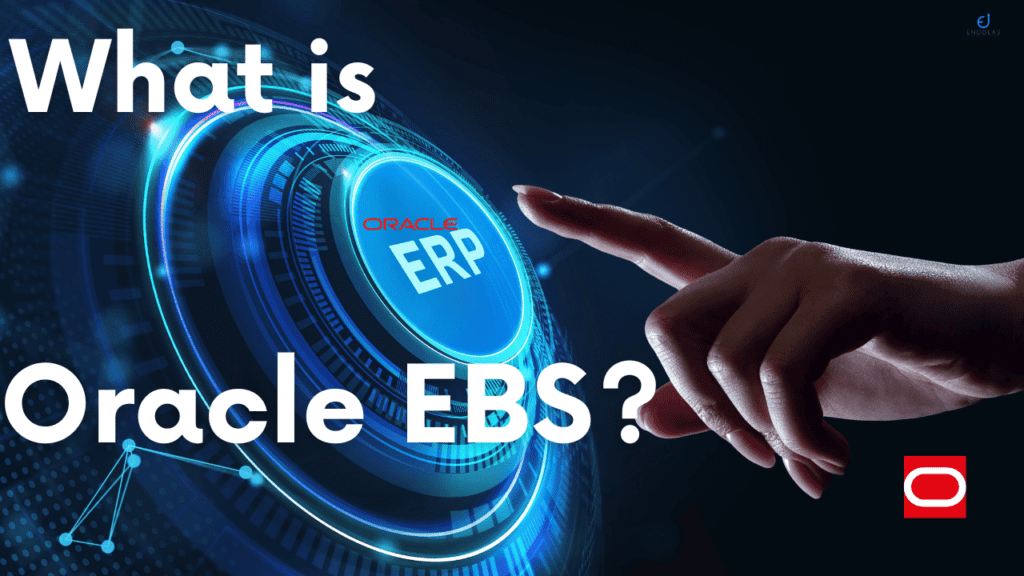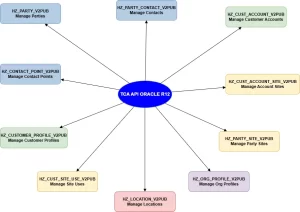
What is Oracle e-Business Suite (Oracle eBS)
Are you looking to streamline your business operations and improve efficiency? Oracle EBS might just be the solution you need. With its extensive range of features and benefits, EBS has proven to be a transformative tool for businesses across industries.
In today’s fast-paced business environment, organizations require systems that integrate operations, streamline workflows, and enhance decision-making. Enterprise Resource Planning (ERP) serves as the backbone of these efforts, consolidating various business activities into a unified, efficient framework. Let’s explore Oracle EBS definition, meaning, features, benefits, and how it transforms businesses across industries.

Table of Contents
What is Oracle e-Business Suite (Oracle eBS)
What Is Oracle ERP and How Does It Work(Oracle EBS Definition)?
ERP, what is Enterprise Resource Planning(Oracle EBS meaning)?
How Oracle EBS Streamlines Business Processes?
ERP vs. Financials: What’s the Difference?
ERP in Action: A Practical Example
Deploying ERP: Key Considerations
Success Stories: Companies Thriving with Oracle ERP
Implementing and Customizing Oracle EBS
Training and Certification for Oracle ERP
ERP: The Engine Driving Modern Business
Next-Generation ERP: Beyond the Basics
What Is Oracle EBS and How Does It Work(Oracle EBS Definition/Meaning)?
Wondering what is EBS in Oracle? Here’s a clear and concise Oracle EBS definition: Oracle E-Business Suite, commonly known as Oracle EBS, is an integrated suite of applications designed to facilitate business management across various functions. These include finance, human resources(HRMS), supply chain management(SCM), customer relationship management(CRM), Trading Community Architecture and project management. Oracle ERP operates on a unified database, enabling real-time data sharing and collaboration among departments. This integration streamlines operations, reduces redundancies, and enhances overall efficiency.
The modular architecture of Oracle e-Business Suite allows organizations to select and implement only the modules they need, making it a scalable solution for businesses of all sizes. Each module seamlessly integrates with others, ensuring smooth data flow across functions. Additionally, Oracle ERP features a web-based, user-friendly interface, enabling employees from diverse backgrounds to navigate the system effortlessly.
Key Concepts and Definitions:
- Oracle EBS Meaning: Oracle EBS stands for Oracle Enterprise Business Suite.
- Oracle EBS Full Form: Full form of EBS is Oracle Enterprise Business Suite.
- Oracle EBS Definition: A suite of integrated business applications that helps organizations manage and automate their core processes.
- Oracle ERP: EBS is a type of ERP system, but it’s more specific to Oracle’s applications.
- Oracle E-Business: This is another common term used to refer to Oracle EBS.
Core Modules of Oracle EBS
In this section you can learn the Oracle EBS modules and how the Oracle EBS modules are classified in different categories in Oracle Apps R12.
- Financial Management (Oracle EBS Finance Modules): Manage financial operations
- General Ledger (GL)
- Accounts Payable (AP)
- Accounts Receivable (AR)
- Fixed Assets (FA)
- Supply Chain Management (SCM)
- Inventory Management
- Order Management
- Procurement
- Human Capital Management (HCM)
- Payroll
- Self-Service HR
- Talent Management
- Customer Relationship Management (CRM)
- Sales
- Marketing Automation
- Customer Support
- Manufacturing & Projects
- Discrete Manufacturing
- Project Costing
- Project Billing
What is Enterprise Resource Planning (Oracle EBS meaning)?
A modern ERP suite extends beyond operational management to include Enterprise Performance Management (EPM)—tools for planning, budgeting, forecasting, and analyzing financial results.
At its core, ERP unites disparate business processes, ensuring a seamless flow of data between departments. This centralization eliminates data silos, minimizes redundancies, and provides a single source of truth that enhances organizational accuracy and collaboration.
For many businesses, ERP is as fundamental as the power supply—it keeps operations running efficiently and effectively.
Oracle Enterprise resource planning (ERP) refers to a type of software that organizations use to manage day-to-day business activities such as accounting, procurement, project management, risk management and compliance, and supply chain operations. A complete ERP suite also includes enterprise performance management, software that helps plan, budget, predict, and report on an organization’s financial results.
Key Features of Oracle EBS(Oracle E-Business Suite)
- Comprehensive Financial Management
- General ledger(GL) management, Accounts payable(AP) and accounts receivable(AR), Fixed assets(FA) and financial reporting, Budgeting and forecasting tools
- Robust Supply Chain Management(SCM)
- Procurement and inventory managementLogistics and order fulfillmentReal-time inventory visibility
- Customer Relationship Management (CRM)
- Manage customer interactionsTrack sales opportunitiesAnalyze customer data for insights
- Human Resource Management(HRMS)
- Recruitment and onboardingPerformance managementPayroll processing
Benefits of Using Oracle EBS
- Improved Operational Efficiency: By consolidating business processes into a single platform, Oracle e-Business Suite eliminates manual data entry and redundancies. This saves time, reduces errors, and allows employees to focus on strategic initiatives.
- Real-Time Insights and Analytics: EBS offers powerful reporting tools to monitor performance, track KPIs, and identify trends. Businesses can make data-driven decisions, respond to market changes, and seize opportunities proactively.
- Scalability and Flexibility: As businesses grow, their needs evolve. EBS adapts by allowing new modules to be added or customized without disrupting existing operations.
- Enhanced Collaboration: A centralized system fosters transparency and accountability. Departments can share information and work collaboratively, ensuring consistent communication and efficiency.
How Oracle EBS Streamlines Business Processes?
Oracle e-Business Suite automates routine tasks like data entry and reporting, reducing the burden on employees and minimizing errors. Real-time analytics help identify bottlenecks and optimize processes. For example, integrating sales and inventory data allows for accurate order timelines, enhancing customer satisfaction. You can get the overall Oracle ERP database design using Oracle Electronic Technical Reference Manual for better SQL design and coding.
ERP vs. Financials: What’s the Difference?
While “financials” are often associated with ERP, they represent only one subset of ERP functionality. Financials focus solely on accounting and financial reporting, encompassing:
- General Ledger
- Subledger Accounting
- Revenue Management
- Payables and Receivables
- Grants and Expense Management
ERP, on the other hand, includes financials alongside modules for procurement, supply chain management, manufacturing, human resources, project management, and more. Advanced ERP systems even integrate front-office solutions, such as Customer Relationship Management (CRM), for a complete 360-degree view of the organization.
ERP in Action: A Practical Example
Imagine an automotive manufacturer managing thousands of components, from front brake pads to engine parts, sourced from multiple suppliers. An ERP system ensures that:
- Each component is accurately tracked by name, lot number, supplier details, and cost.
- Supply chain workflows, such as requisition, purchase, and delivery, are seamlessly connected.
- Data integrity is maintained, eliminating inconsistencies across departments and systems.
With ERP, the manufacturer can analyze total spending on brake pads, identify cost-saving opportunities, and streamline procurement processes. This level of insight is impossible with disconnected spreadsheets or siloed software solutions.
How ERP Systems Work
ERP systems act as an integrated platform, accessible either on-premises or via the cloud, designed to manage production, distribution, and service-based businesses. Here’s how:
- Comprehensive Integration: ERP systems unify core functions like financial management, supply chain logistics, and human resources into a single database.
- End-to-End Visibility: By tracking processes from procurement to production and delivery, ERP systems provide complete operational transparency.
- Customizable Workflows: Industry-specific configurations ensure ERP solutions adapt to unique business needs.
This holistic framework allows departments to access accurate, real-time data, fostering collaboration and informed decision-making.
Key Benefits of ERP Systems
- Data Centralization: A unified data repository ensures accuracy, consistency, and accessibility for all stakeholders.
- Improved Collaboration: By connecting departments through shared workflows, ERP promotes teamwork and accountability.
- Operational Efficiency: Automation and integration reduce manual errors, eliminate redundancies, and optimize processes.
- Scalability: ERP solutions grow with your business, adapting to evolving needs and industry challenges.
- Enhanced Decision-Making: Real-time analytics and reporting empower leaders to make data-driven choices.
Deploying ERP: Key Considerations
1. Selecting the Right Solution
Choose an ERP system that aligns with your organization’s size, industry, and strategic goals. Modern cloud-based ERP platforms, like Oracle Cloud ERP, offer unparalleled flexibility and advanced capabilities.
2. Customization and Integration
Tailor ERP workflows and integrate them with existing systems to ensure seamless adoption and maximum ROI.
3. Employee Training
Invest in training programs to equip your workforce with the skills needed to navigate ERP tools effectively.
4. Partnership with Leadership
ERP success requires collaboration between IT, finance, and operational leaders, including the CFO, CIO, and COO.
Success Stories: Companies Thriving with Oracle EBS
- Manufacturing Industry: A large manufacturing firm reduced inventory costs by 30% and improved order fulfillment times by 25% after integrating its supply chain with Oracle EBS.
- Retail Sector: A retail organization increased sales by 15% within a year by leveraging Oracle EBS’s CRM module for better customer engagement and sales insights.
- Healthcare: A healthcare provider streamlined financial processes, reducing financial close times by 40% and enhancing compliance with regulatory standards.
Implementing and Customizing Oracle EBS
Successful implementation of EBS requires careful planning:
- Assessment: Define business needs and objectives.
- Module Selection: Choose relevant modules.
- Customization: Tailor workflows, reports, and integrations to align with operations.
- Training: Equip users with the skills to maximize Oracle EBS’s capabilities.
Engaging with Oracle consultants or implementation partners can help ensure a smooth transition and optimal outcomes.
Training and Certification for Oracle EBS
Oracle offers extensive training resources, including online courses and workshops. Certification programs validate expertise, enhancing career prospects and ensuring organizations have skilled professionals to manage the system effectively. Investing in training fosters innovation and maximizes ROI.
ERP: The Engine Driving Modern Business
ERP systems are no longer just operational tools—they are strategic assets that enable businesses to adapt, grow, and compete in a data-driven world. With features like real-time insights, advanced analytics, and next-gen integrations, ERP solutions unlock new opportunities for innovation and efficiency.
Whether you’re an enterprise looking to streamline global operations or a small business seeking growth, ERP is the key to building an agile, connected, and future-ready organization.
Curious about how ERP can transform your business? Dive into the possibilities with Oracle Cloud ERP—ranked among the top financial management solutions. Stay tuned for more insights, tips, and success stories on leveraging ERP for business excellence!
Next-Generation ERP: Beyond the Basics
Cloud-based ERP solutions incorporate cutting-edge technologies to deliver unmatched functionality and insights:
- AI and Machine Learning: Automates routine tasks, forecasts trends, and enhances decision-making.
- Internet of Things (IoT): Connects physical assets to ERP systems, enabling real-time tracking and predictive maintenance.
- Blockchain: Strengthens data security and ensures transparent supply chain operations.
- Digital Assistants: Simplifies user interactions and boosts productivity.
These innovations transform traditional ERP systems into dynamic platforms that foster agility, efficiency, and strategic growth.
Leveraging the Power of Oracle EBS for Business Success
Oracle EBS is a comprehensive, scalable solution that transforms business operations. Its integration, real-time insights, and flexibility make it a critical asset for companies aiming to thrive in competitive markets. By prioritizing training and leveraging its full potential, businesses can achieve operational excellence, foster collaboration, and drive sustained growth.
Take the first step toward revolutionizing your business processes with Oracle EBS and unlock unparalleled efficiency and success.
Oracle EBS FAQs
Oracle EBS full form is Oracle e-Business Suite.
Oracle EBS is a type of software that organizations use to manage day-to-day business activities such as accounting, procurement, project management, risk management and compliance, and supply chain operations.
Oracle EBS Suite is a type of software that organizations use to manage day-to-day business activities such as accounting, procurement, project management, risk management and compliance, and supply chain operations.
It is an integrated suite of Oracle applications that support business processes across an enterprise. It provides a unified platform to manage operations efficiently and securely.




Pingback: Complete Guide to Flexfields in Oracle Apps R12
Pingback: Inventory Tables in Oracle Apps R12: Ultimate Guide
Pingback: Oracle EBS Integration with Third-Party Systems Using APIs
Pingback: How To Open GL Period in Oracle Apps R12: A Complete Guide
Pingback: Learn Web ADI: Web Applications Desktop Integrator
Pingback: Concurrent Program in Oracle Apps R12: The Ultimate Guide
Pingback: Trading Community Architecture: Ultimate Guide
Pingback: Complete Guide to FNDLOAD Commands in Oracle Apps R12
Pingback: Trading Community Architecture(TCA): Ultimate Guide – Enodeas
Pingback: Oracle Json Format and Its Usage in Oracle Apps R12
Pingback: Oracle LISTAGG Function: Turning Rows into a Single String
Pingback: Oracle Alter Table Add Column - Ultimate Guide – Enodeas
Pingback: PO Tables in Oracle Apps R12: A Complete Guide – Enodeas
Pingback: SQL Loader in Oracle Apps R12 - Advanced Guide
Pingback: Oracle eTRM: The Developer’s Guide to Oracle EBS
Pingback: Mastering Active Session History: Best Queries & Practices
Pingback: How to Connect Oracle Database Using Python Script – Enodeas
Pingback: FNDLOAD in Oracle EBS: Complete Guide to Automation
Pingback: Parquet vs. CSV: When to Select One for Optimal Performance – Enodeas
Pingback: How Automated Solutions with EBS Can Drive Business Growth
Pingback: Concurrent Manager in Oracle Apps R12 with Useful Queries – Enodeas
Pingback: Best Way to Learn GL Interface in Oracle Apps R12
Pingback: Top SQL Queries Asked in Interview in Oracle R12 – Enodeas
Pingback: Oracle EBS Efficiency using Python Automation(python and Oracle)